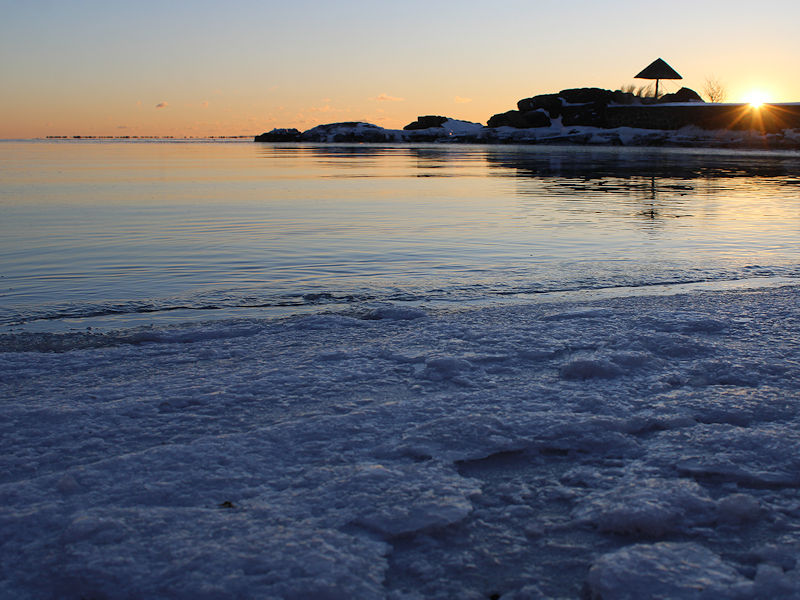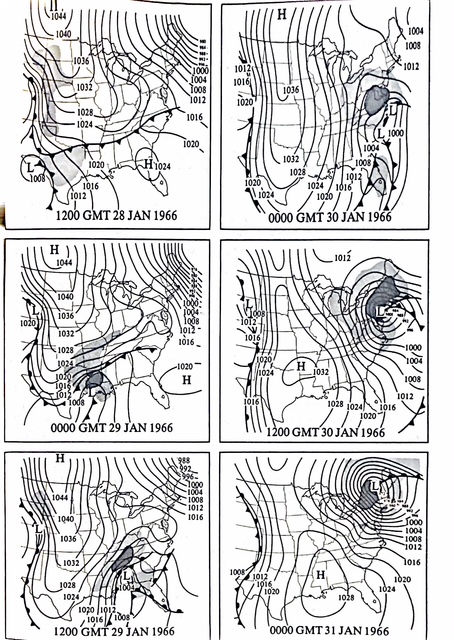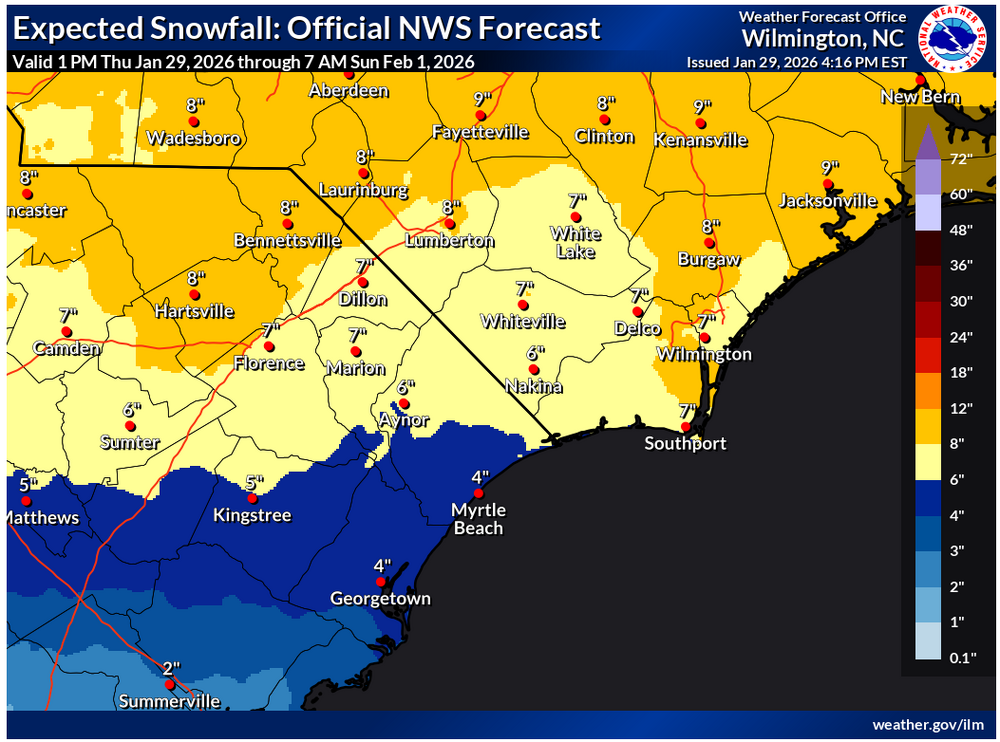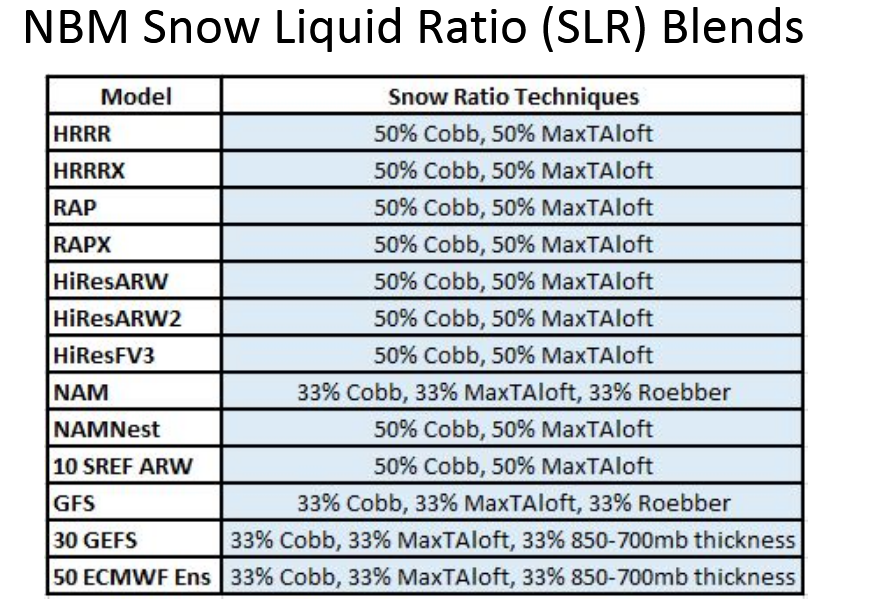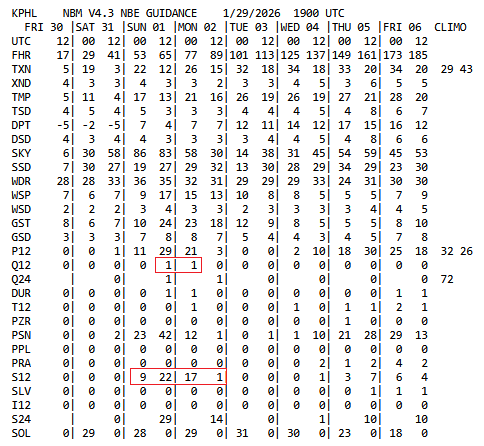-
Posts
23,743 -
Joined
Content Type
Profiles
Blogs
Forums
American Weather
Media Demo
Store
Gallery
Everything posted by donsutherland1
-
-

The “I bring the mojo” Jan 30-Feb 1 potential winter storm
donsutherland1 replied to lilj4425's topic in Southeastern States
Good luck with the snow. I hope it meets or exceeds your expectations. -

E PA/NJ/DE Winter 2025-26 Obs/Discussion
donsutherland1 replied to LVblizzard's topic in Philadelphia Region
The last time in Philadelphia was 2009-2010. -

The “I bring the mojo” Jan 30-Feb 1 potential winter storm
donsutherland1 replied to lilj4425's topic in Southeastern States
Kuchera maps are different from 10:1 maps. -
-
Yesterday was -4.873.
-
Today is New York City's 7th consecutive day with a low < 20°. The last streak as long or longer than 7 days was during December 27, 2017-January 8, 2018 (13 days).
-
Below is the NWS forecast for parts of North Carolina and South Carolina. Since 1950, eight storms brought 4" or more snow to Wilmington, NC. Just one of those storms brought measurable snowfall to New York City.
-
So far, one.
-
Yes. I've fixed the typo.
-
A fresh surge of Arctic air is moving into the region. Tonight and tomorrow night will likely see the temperature bottom out at their lowest levels this winter. Single digits are likely in Central Park. The last winter with more than one single-digit day was Winter 2022-23 when there were three such days. Highs will be mainly in the upper teens and lower 20s through Saturday. The last winter with more than one high in the teens was Winter 2018-19 when there were two such days. Temperatures should begin to moderate on Sunday into early next week and could briefly rise to or above freezing. Nevertheless, readings are likely to remain below normal into at least the start of next week. Some light snow or flurries remain possible on Sunday if a developing storm passes close enough to the coast. This outcome is not assured. Eastern Long Island into southeastern New England would have the greatest chance of seeing an accumulating snowfall. Overall, January 20th-February 3rd will likely be the coldest and perhaps snowiest two-week period this winter. The forecast WPO-/EPO-/AO-/PNA+ pattern is typically the coldest pattern in January and among the coldest during the first half of February. A persistently positive PNA will have above climatological risk of moderate or significant snowfalls. For perspective, the coldest two-week period this winter prior to January 20th was January 3-16, 2026 and January 4-17, 2026 with a mean temperature of 30.3°. The snowiest two-week period was December 14-27, 2025 when 7.2" of snow fell. Already, snowfall since January 20th has surpassed that figure. The ENSO Region 1+2 anomaly was -0.3°C and the Region 3.4 anomaly was -0.7°C for the week centered around January 14. For the past six weeks, the ENSO Region 1+2 anomaly has averaged -0.48°C and the ENSO Region 3.4 anomaly has averaged -0.68°C. La Niña conditions will likely continue into at least late winter. The SOI was +6.84 yesterday. The preliminary Arctic Oscillation (AO) was -4.195 today. Based on sensitivity analysis applied to the latest guidance, there is an implied near 100% probability that New York City will have a cooler than normal January (1991-2020 normal). January will likely finish with a mean temperature near 30.2° (3.5° below normal). Supplemental Information: The projected mean would be 2.4° below the 1981-2010 normal monthly value.
-
I suspect that there's a programming issue of some kind. Last winter, there were a number of cases where the NBM showed measurable snow even when QPF was 0.00". I raised the issue and was told it would be addressed in the next version (v. 5.0). I suspect that issue is skewing the numbers. For the upcoming system, the 19z NBM showed 0.02" QPF for Philadelphia. Its snowfall forecast was 4.9" (4.3" if 24-hour snowfall is used). That's a wholly unrealistic snowfall estimate.
-
I don't know. Normally, one doesn't see such a pattern. More may have been involved.
-
Don't forget X and YouTube, as well.
-

2025-2026 ENSO
donsutherland1 replied to 40/70 Benchmark's topic in Weather Forecasting and Discussion
Based on the preliminary data, the January PNA has averaged +0.172. That average is poised to increase further over the next two days. Given the PNA forecasts, it is virtually certain that a regime change to PNA+ occurred following the long-duration PNA- as had occurred in all 10 previous cases following the end of winter PNA- regimes of 25 days or longer. This outcome runs counter to some of the bold claims made on social media. It also illustrates anew why social media influencers, who are often unaware of historical outcomes, among other things, are typically not a good source of forecasting information. In contrast, numerous people here had correctly suggested the risk of a switch from December's PNA- to a PNA+ in January. -
That was from the 1z NBM (QPF: 0.11"); the 13z cycle had 0.04" QPF for Philadelphia. Moreover, it seems that Mount Holly is using v4.3, which is the operational version. V.5.0 is currently in testing, but isn't widely accessible and is not incorporated into the widely used probabilistic tools. V5.0 is supposed to have more realistic snow-liquid ratios, but it won't become operational until spring. During prior upgrades, there was a test site where one could access the output. This time around, the test site isn't being utilized, which undermines early operational examination of the newer version.
-
Here's Mount Holly's latest excerpts concerning the NBM: Area Forecast Discussion National Weather Service Mount Holly NJ 612 AM EST Thu Jan 29 2026 ...When compared to Wednesday, the latest (01Z) NBM probabilistic data has remained steady near the shore but trended down for places close to the Delaware Valley. For snow amounts greater than 2 inches (plowable), the range remains around 60-70 percent near the coast to 25-35 percent near the I-95 corridor with lower probabilities N/W of the urban corridor. For 6+ inches, these probs have dropped and are now around 20 percent near I-95 up to 35-50 percent near the coast.
-
During the 1/29 0z cycle, all of the major global models keyed in on developing a lead shortwave in a mix of multiple shortwaves. As a result, the baroclinic zone was pulled sufficiently far to the east and, along with it, the opportunity for measurable snowfall from Philadelphia to New York City. A few die-hard EPS members continued to insist on a 6" (14%) or above and 10" (10%) or above snowfall in Central Park, keeping alive a theoretical possibility of a significant snowfall. The 11z NBM showed 0.14" QPF in New York City and 0.17" at Philadelphia. For all practical purposes, the question is increasingly becoming one whether it will snow at all in Philadelphia and New York City and, if so, will a light accumulation be possible. Eastern Long Island and southeastern New England remain poised for at least some snowfall. A gusty wind and elevated high tide levels remain likely on Sunday whether or not there is snow. If the low/no snow solution plays out, one question that will linger is why multiple 6z and 18z cycles sloshed westward with their solutions only to be corrected by the subsequent 0z and 12z guidance. In any case, the 1/29 12z cycle could provide a degree of confirmation for the overnight model convergence. If the consensus holds, that agreement could be a strong signal that despite a complex set up, the guidance has keyed in on critical elements to the evolution of the weekend weather. The guidance is currently moving into its more skillful range when it comes to resolving synoptic details. The 1/30 0z cycle could put the wraps on the event or non-event. Finally, there may be a short opportunity for the temperature to reach or exceed freezing early next week in New York City.
-
Yes. That’s true.
-
Yes. It might not be until Friday before a solid consensus is achieved.
-
The 0z RGEM develops the lead low. Not surprisingly, it exits well south and east of the region. The earlier run developed the trailing low.
-
I just wanted to illustrate that it makes a difference which low will be dominant. The lead wave and the storm will almost certainly pass far too the east with little impact on most of the NYC area. If it's the second one, the storm will be more impactful.
-
Arctic air now covers the region. Highs will be mainly in the lower 20s through Saturday. One or more days could see highs in the teens. The last winter with more than one high in the teens was Winter 2018-19 when there were two such days. Moreover, New York City has the potential to see the temperature dip into the single digits for lows on one or more days during this period. The last winter with more than one such day was Winter 2022-23 when there were three such days. Some snow flurries or snow showers are possible Thursday night into Friday morning. Temperatures should begin to moderate on Sunday into early next week. Nevertheless, readings are likely to remain below normal into at least the start of next week. Additional snow is possible on Sunday if a developing storm passes close enough to the coast. Eastern Long Island into southeastern New England would have the greatest chance of seeing an appreciable or greater snowfall. There remains significant uncertainty about the location of the storm's development and its track. A large storm would be historic. For reference, New York City has seen just one 10" or above snowstorm one week or less following a 10" or above snowstorm: February 3-4, 1926 (10.4") and February 9-10, 1926 (12.4"). The shortest interval between 10" or above daily snowfalls is 14 days: March 2, 1896 (10.0") and March 16, 1896 (12.0"). Records go back to 1869. Overall, January 20th-February 3rd will likely be the coldest and perhaps snowiest two-week period this winter. The forecast WPO-/EPO-/AO-/PNA+ pattern is typically the coldest pattern in January and among the coldest during the first half of February. A persistently positive PNA will have above climatological risk of moderate or significant snowfalls. For perspective, the coldest two-week period this winter prior to January 20th was January 3-16, 2026 and January 4-17, 2026 with a mean temperature of 30.3°. The snowiest two-week period was December 14-27, 2025 when 7.2" of snow fell. Already, snowfall since January 20th has surpassed that figure. The ENSO Region 1+2 anomaly was -0.3°C and the Region 3.4 anomaly was -0.7°C for the week centered around January 14. For the past six weeks, the ENSO Region 1+2 anomaly has averaged -0.48°C and the ENSO Region 3.4 anomaly has averaged -0.68°C. La Niña conditions will likely continue into at least late winter. The SOI was +6.84 today. The preliminary Arctic Oscillation (AO) was -4.873 today. That is the lowest figure since February 15, 2025 when the AO was -5.278. Based on sensitivity analysis applied to the latest guidance, there is an implied near 100% probability that New York City will have a cooler than normal January (1991-2020 normal). January will likely finish with a mean temperature near 30.2° (3.5° below normal). Supplemental Information: The projected mean would be 2.4° below the 1981-2010 normal monthly value.
-
There are so many pieces to the synoptic puzzle. The models are still trying to figure out how they fit together. This is a complex setup and it might not be until Friday before there is a good consensus. Several ensemble members have continued to show a 6"+ storm for NYC. That's still on the table. With greater confidence, it does appear that eastern Long Island into eastern New England have the highest chance of seeing an impactful event. Still, there's a lot of room for change.
-
It's a good thing he didn't add "Maybe." We'd all be paying royalties to Carly Rae Jepsen who owns the intellectual property rights to the word.


